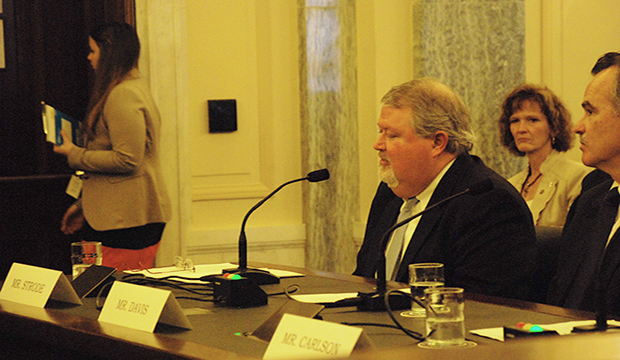
John Strode, vice president of Arkansas-based Ritter Communications, testified before a Senate subcommittee on the importance of federal support for rural service providers.
WASHINGTON – While scattered populations and difficult terrain make it hard to provide phone and Internet access in rural America, government regulatory burdens are an even bigger problem, the vice president of Arkansas-based Ritter Communications told a Senate hearing Tuesday.
John Strode told the hearing of the Subcommittee on Communications, Technology, and the Internet, chaired by Arkansas Sen. Mark Pryor, that companies like his “serve approximately 5 percent of the nation’s population,” Strode said, “but approximately 40 percent of the nation’s land mass.”
His company employs about 280 people –180 from Arkansas. It provides phone lines to 33,000 homes and businesses – and thousands more broadband and basic cable subscribers.
Over the years, assistance from the Federal Communications Commission and its Federal Universal Service Fund, among other types of aid, has helped to broaden service availability, but more help is needed, Strode said. Cuts, caps and constraints on government funding are hurting companies’ cost recovery, he said. His Jonesboro-based company is hurt by cost limits in areas that are expensive to serve.
Strode also criticized larger phone companies. “Many of the problems are caused by people calling from larger cities trying to reach rural areas,” he said. “If the carriers don’t deliver those calls to us, we can’t deliver those calls to our customers. There’s nothing we can do.”
Patricia Jo Boyers, president and CEO of BOYCOM Cablevision, agreed with Strode on the need for oversight of the bigger companies.
“Little folks like us have no recourse,” said Boyers, whose company services rural Missouri. “We’re just a little, small mom and pop. I’m the mom and the pop is sitting three rows behind me. We can’t compete with those big guys, we can’t compete with government subsidized money.”
In an interview after the hearing, Strode gave a message to his Arkansas customers: “We are doing our best with what’s available to us to provide high-quality services to rural Arkansas so that they get the same quality service as those in Little Rock or Fayetteville or larger cities get. It’s a real challenge.”
Strode also had a message for federal regulators. “I think the FCC would be well served to visit a place like Jasper, Arkansas, and see what some of the challenges we face,” he said. “Broadband is just as important to someone in Jasper as it is in Washington, D.C.”
